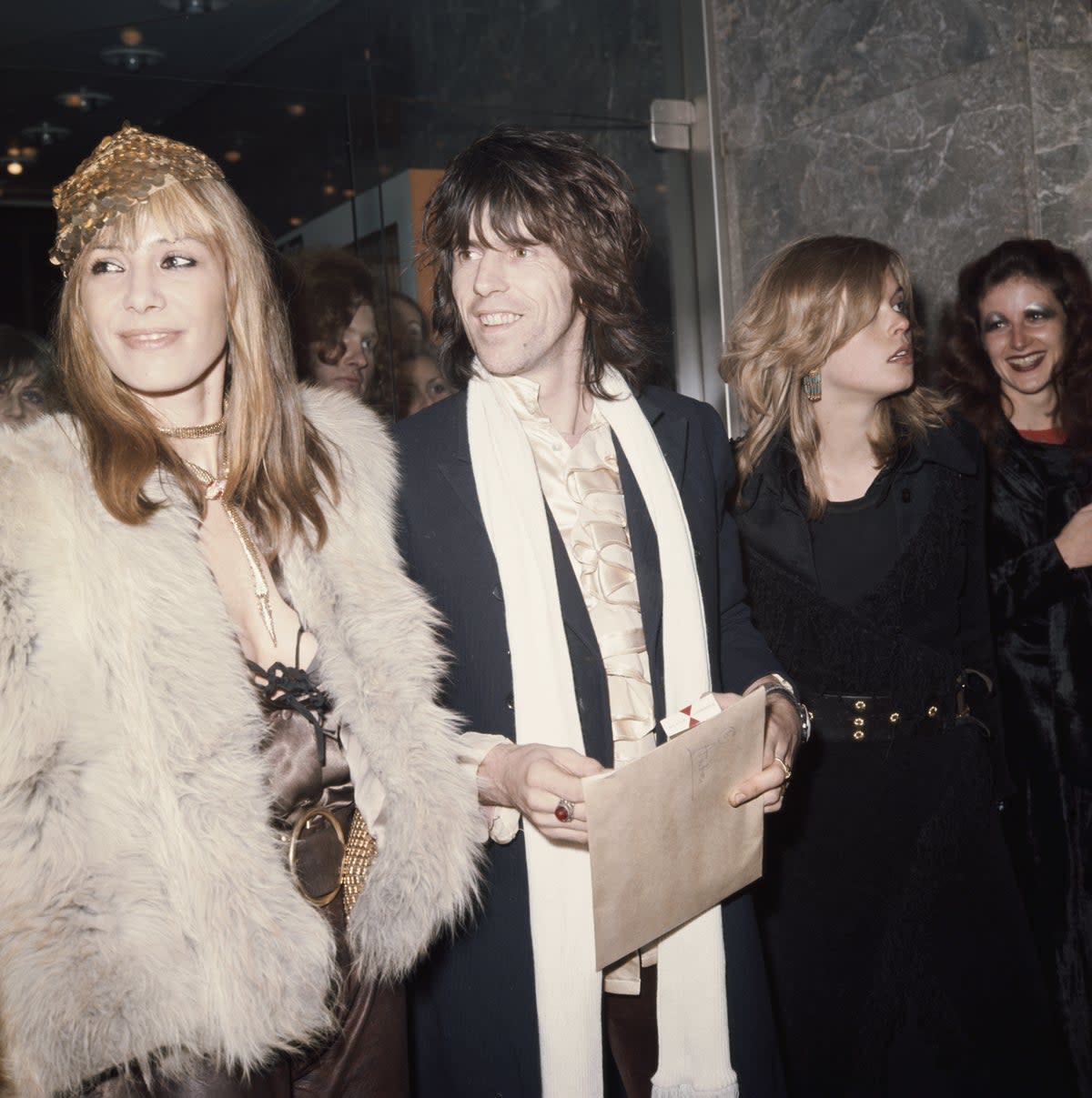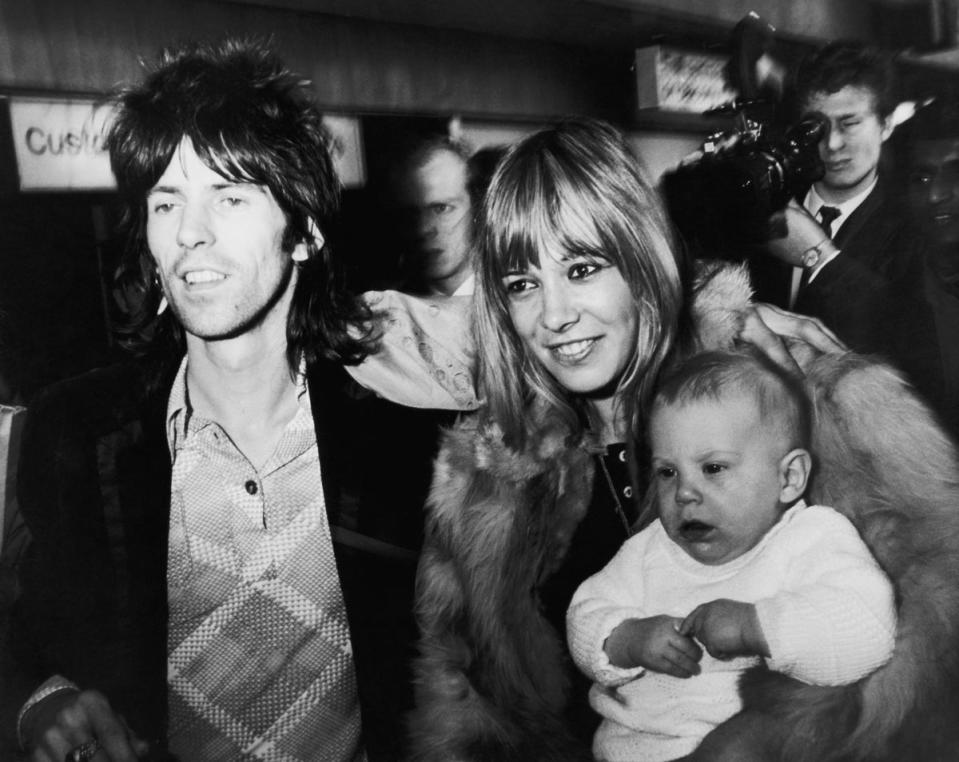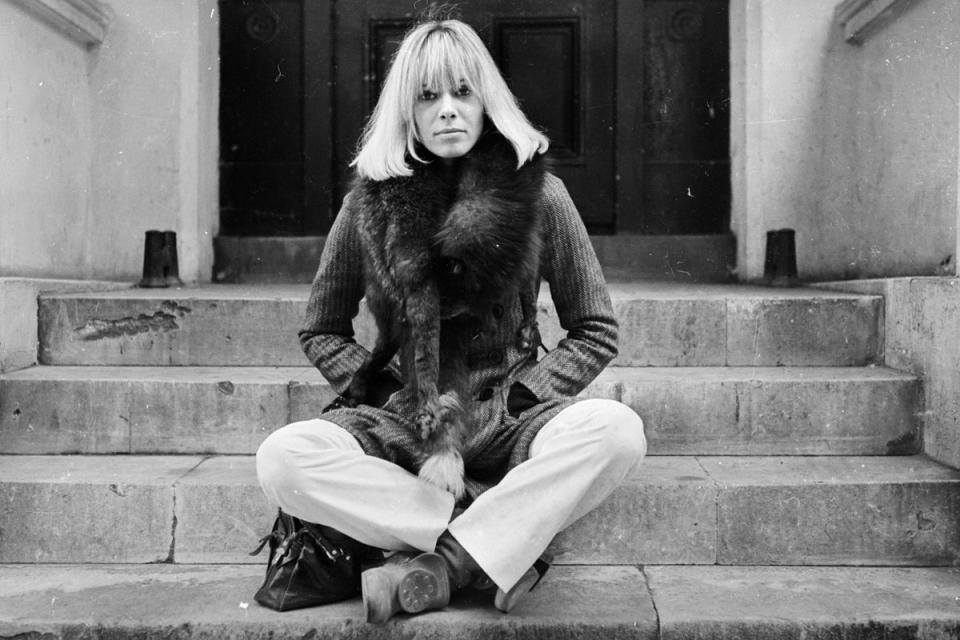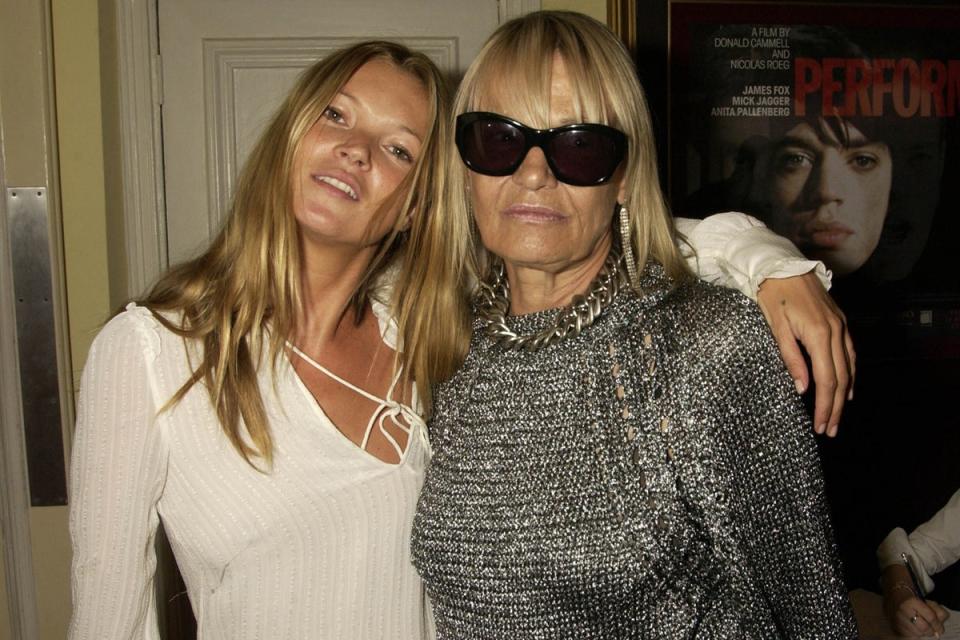Anita Pallenberg on sex, drugs and her time with the Rolling Stones

Anita Pallenberg was the quintessential Londoner who sparked off more trends than Jesus, knew more people than God and was more respected than the Virgin Mary.
In truth, she was the Sixties/Seventies equivalent of her dear friend Kate Moss. Indeed, known as the fifth Rolling Stone, her relationship with the band began in 1965 with a tempestuous two-year relationship with Bryan Jones after which she went out with Keith Richards and had three children – Marlon, Dandelion and their late daughter Tara.
I first met her in 1981 when I introduced her to Iggy Pop, then didn’t see her till the Millennium New Year’s Eve bash at Ronnie Woods, Subsequently, we’d bump into each other at highfalutin soirees and always end up sitting in the corner of the room together, neither of us that amused by the, at times, pretentious party peeps. Anita had seen it all and was only impressed by things you can’t buy, such as honesty, loyalty and a free spirit.
Later, I became close friends with her son Marlon and was often happy to housesit his property in West Sussex with Anita, my wife and my son who loved her. It was here at close quarters, away from the kafuffle of noisy groovy London parties, that I discovered just how remarkable a lady Anita was.
Finally, this reality has at last been celebrated in a documentary, Catching Fire, that is based on her recently-discovered memoirs. The picture features, among others, Keith Richards, their children Marlon and Dandelion, Marianne Faithful and Kate Moss and paints a most vivid and accurate portrait of the erstwhile maverick.
As Keith Richards says in the movie, “we’re talking about a one-off here… she was my woman and it was a hell of experience but she made a man out of me,” or as Moss adds, “she was the original Bohemian rock chick that people still aspire to today… she just had such a strong personality and was everything you’d want a rock star... or for me… a woman to be.”

CS - What did you think of London when you first came here?
AP - Well to begin, I always lived in Chelsea really. But what first shocked me in Chelsea was that you had all these hippy dippy girls walking barefoot down the Kings Road. I am Italian and in Italy only very poor people walk barefoot and here it was the complete opposite. I thought what a weird place as in Italy shoes are an indication of wealth. Funny how these little things always stuck in my mind even all these years later.
CS - A lot has been written about that swinging Sixties London scene, but what was it like for you?
AP - Well we used to go to Granny Takes A Trip and they’d give me clothing and I’d hang out the back room smoking a lot of dope in the back room. There was a lot of posing going on. I was into Biba and Granny Takes A Trip which was more the velvets, tight jackets with big shoulders and velvet trousers and mini-skirts. It was hippy time, but I never was a hippy. We’d go to the AD Lib club in Leicester Place and hang out and see Peter Cooke and all those guys. It was quite a lively scene but all very intellectual. I read the entire works of Madame Blavatsky, the Tibetan influenced theosophist, in a week.
CS - You really don’t see that these days where intellectual properties are all important in a scene that could be seen as just fashion and music orientated.
AP - No people just play with mobiles and computer games. We were into reasoning. After a night of drugs and debauchery we’d see the light and it was BIG. I never got into the Maharishi Yogi thing though as the Beatles did. I never followed any of that stuff. I just tried to find out for myself. It didn’t seem that real to me but some people, like George Harrison. who was such a lovely human being, found something in it.
CS - Were you into [Allen] Ginsberg and [Paul] Bowles and the beat poets?
AP - Well, I had already had a brush with them when I lived in New York when I was 19 and it was 1963. I met all of them – Ginsberg, Gregory Corso, Burroughs – and so I knew where they were at. I used to clean Jasper John’s brushes, hung out with all the pop artists – Warhol, Rauschenberg – and also hung out with Kenneth Anger, Mike McClure and Terry Southern the screenwriter for Easy Rider who also wrote Barbarella and Candy, which I was in.
CS - You do seem to have been around in all the right places at all the right times.
AP - Oh yes. I was well-travelled before I met the Stones. I managed to be hip for a long time. I was lucky to be around in Rome in 1960 just as La Dolce Vita and all that was happening and met Fellini, Alberto Moravia, Visconti, Pasolini and then I was in Paris of course and met Bunuel and Truffaut in the early sixties when the French New Wave was in full swing.
CS - How did you meet Brian Jones?

AP - I was doing a modelling job Germany and I met Brian. When we were together we were taking loads of acid – maybe too much – and Brian always had bad trips and total horrors. Acid just didn’t suit him. Then it all came to a head when we got busted in London and decided to go to Morocco. It was then that Brian got sick and started to get very violent and angry with me. Keith was not amused and we drove off together and left Brian there. That was when my relationship with Keith started that lasted 15 years.
CS - How did you start acting?
AP - My parents were Bohemian aristocracy and lost everything in the war but thought acting was for prostitutes. I didn’t care. I was a model in New York and Paris which I hated so tested for Volker Schlöndorff, the director of The Tin Drum, for A Degree of Murder and got the part. So, I had a big crash course in cinema with Volker and through him I met Luis Bunuel, Louis Malle, Truffaut. We’d watch movies go out dancing, see the Who, Vince Taylor all those guys then would drive off to St. Tropez when it was almost a village
CS - You starred in Performance, now seen as one of the great London films. How did the movie come about for you?
AP - I met Donald Cammel [Performance director] in Paris and he had all these scenarios about rock stars and was going on and on about the Stones. I met him again on the beach at St. Tropez as he was writing Performance and all the papers blew into the water so I had to retrieve them and iron them out. That was my greatest contribution to the script.
CS - Performance does seem to say goodbye to the hippy and welcome a new era. Jagger’s character (the hippy dippy reclusive rock star Turner being emblematic of the eras naïveté, while Fox’s South London gangster Chaz, on the run and on the scam, is decidedly more immoral and contemptuous. Performance is not an easy ride.
AP - Everyone else was dropping out and doing their hippy thing whereas in my mind the movie showed it was all over. It was the end of an era of innocence for me and the beckoning of a new one that was harsher. Less idealistic and more cynical. It was as if the James Fox character almost introduced another element into something that was on the way out.
But it was tough. Nic Roeg would spend seven hours lighting one shot and then we’d do like 28 takes. Sometimes I’d have to ask whether I’d done my lines as I was so stoned I couldn’t remember. We were doing coke, heroin, acid and smoking pot non-stop. Meanwhile Donald would run around screaming, trying to put all of these mad deviant sexy scenarios into the movie. At one time we spent a week in bed with Nic and Donald with their 16mm cameras under the sheets but it was all edited out. There were all kinds of sex going on but I put it down to method acting. It was quite severe, it was like a porn shoot, and Donald loved it. I can still see Donald’s happy smiling face emerging from beneath the sheets asking Nic “How was it for you?”
CS - There were rumours that the sex scenes were real.

AP - No, no, no! Never! Jagger was the last guy I would have done that with. I was a one-man girl at the time. I was never charmed by Mick like all the ladies, and all we ever talked about was Keith who I was totally in love with.
CS - Having been with Brian Jones, you were now doing sex scenes with Mick Jagger. What did Keith say?
AP - We never talked about it. It was a typical British scenario. Never ever.
CS - James Fox is particularly effective ?
AP - James Fox did a lot of work for the role hanging out with real gangsters. David Litvinoff, was the films technical consultant come fixer who wandered between the Chelsea set and hardcore criminals, between Soho and the East End knew them all. He was a friend of Ronnie Kray and used to escort James to all these clubs. For me it was strange to see a posh guy playing a gangster and Mick Jagger who was a common guy playing the posh bloke.
CS - What about Johnny Bindon in the movie? I knew him. He was a proper Battersea gangster who used to collect protection and was charged with murder.
AP - Yes, it was Litvinoff who got him. I met after the movie and he was in tears to have been in that movie it was the best thing that happened in all his life.
CS - I saw the film the Princess and The Gangster about his affair with Princes Margaret. The rumour was that, such was the length of his penis, he could balance three-pint glasses on it.
AP - We all heard about it - but I never saw it. He kept that to himself.
CS - Were you disappointed when Warner’s destroyed the print and shelved it for two years?
AP - I remember Donald was most upset when he had to cut the scene where Jagger and Fox kiss each other. But I didn’t even know. I was just an actress. They gave me a fee and that was it. Then I had Marlon, which was planned. I made a conscious decision and did not want to let Keith down as we had such a good relationship and I loved him dearly. Everybody was always on about how I was a Stones climber as I went through Brian Jones, was with Keith Richards and wanted to end up with Mick Jagger but that was not my intention at all. He was not my type at all.
CS - I guess the last thing you needed was all the bad press the movie received?

AP - I avoid all that as I’d had enough drama. We’d had the Redlands bust, the South of France heroin bust. The whole police thing was really bad. So, we had to flee England as the police had a warrant out on us. We moved house like 20 times. We went to Switzerland as they were the only ones who would have us.
CS - And it didn’t stop there?
AP - Ha! I then had to deal with Keith’s big Canadian bust in 1977. He got arrested with 22 grams of heroin and 5 grams of cocaine. I became like a guinea pig for all kinds of drug rehabilitation programmes. It lasted years. Three years probation. Drug urine tests every ten days. I lost ten years of my life. I was living in New York. I don’t remember much of that period – nights go into days and days go into nights and people come up to you and tell you what you were doing and say “Have you got the right person?”
CS - What happened when you finished with Keith?
AP - I lived in Long Island and Westchester with Marlon and Keith’s father for about nine years. I had some boyfriends, but nothing serious.
Then I got badly into heroin again, came back to England, went to rehab and got off the drugs but then was a very bad alcoholic and it took me twenty years or something like that to come out of it, but I haven’t had drink or drugs in years now. I did a BA in textiles and fashion at Central St Martins which helped, and it was great, as I love the energy of young people. Afterwards, I helped out Anna Schwei, Marc Jacobs and Vivienne Westwood. I sourced things from second hands shops, sourced materials, they copied some of my own stuff. I guess I provided some inspiration. And funnily, I just ended up in bed with James Fox.
CS - Really?
AP - Ha! Not in real life but in this film Mr Lonely by Harmony Korine whose Marlon’s friend and I play the f***king Queen. Can you imagine that?
CS - And now?
AP - Well the best place be in the world is London. The young have so much more interesting style than Italy or France. It is the place to be. Now I am working on a Performance book and want to interview as many people as are still alive. Johnny Depp, Cimino, Bertolucci, Scorsese. I was working on my own book – maybe an autobiography but not one of those horrible dish the bloody dirt books. Just my story maybe if I can find a publisher who doesn’t want another salacious f***king book on the Stones.
Interviews conducted in 2010 and 2014
Catching Fire: The Story of Anita Pallenberg is in all fine cinemas and on Prime, Apple TV and YouTube


